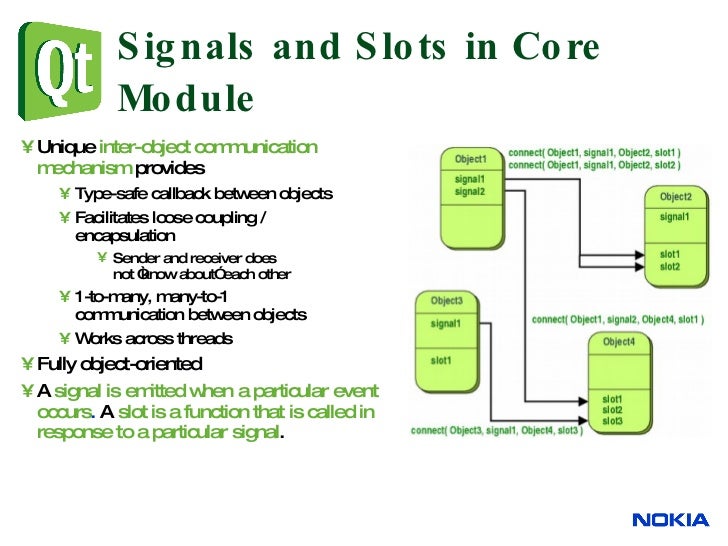Qt Thread Slot Signal
- Qt Multi Thread Signal Slot
- Qt Signal Slot Different Thread
- Qt Thread Slot Signal Mounts
- Qt Signal Return Value
Signals: void dispatch(int threadid, int value); Similarly, a receive slot with the same arguments needs to be created to receive the signal. Public slots: void receive(int threadid, int value); Now, this will work very nicely when one is dealing with the predefined primitive or the qt data types. Even if the sender of the signal and the receiver of the slot are in different threads, we should still pass arguments by const reference. Qt takes care of copying the arguments, before they cross the thread boundaries – and everything is fine. From my reading of it, the signal/slot connections between the model and view have to be made with Qt::DirectConnection. However, making connections across threads would have to be Qt::QueuedConnection.
Example
Qt Multi Thread Signal Slot
Some times you see a signal is emitted in sender thread but connected slot doesn't called (in other words it doesn't receive signal), you have asked about it and finaly got that the connection type Qt::DirectConnection would fix it, so the problem found and everything is ok.
But generaly this is bad idea to use Qt:DirectConnection until you really know what is this and there is no other way. Lets explain it more, Each thread created by Qt (including main thread and new threads created by QThread) have Event loop, the event loop is responsible for receiving signals and call aproporiate slots in its thread. Generaly executing a blocking operation inside an slot is bad practice, because it blocks the event loop of that threads so no other slots would be called.
If you block an event loop (by making very time consuming or blocking operation) you will not receive events on that thread until the event loop will be unblocked. If the blocking operation, blocks the event loop forever (such as busy while), the slots could never be called.
In this situation you may set the connection type in connect to Qt::DirectConnection, now the slots will be called even the event loop is blocked. so how this could make broke everything? In Qt::DirectConnection Slots will be called in emiter threads, and not receiver threads and it can broke data synchronizations and ran into other problems. So never use Qt::DirectConnection unless you know what are you doing. If your problem will be solved by using Qt::DirectConnection, you have to carefull and look at your code and finding out why your event loop is blocked. Its not a good idea to block the event loop and its not recomended in Qt.
Here is small example which shows the problem, as you can see the nonBlockingSlot would be called even the blockingSlot blocked event loop with while(1) which indicates bad coding
 28 Aug 2011 Matteo Mattei pythonpysideqtthread
28 Aug 2011 Matteo Mattei pythonpysideqtthreadIn these days I started studying PySide. After some days spent in reading lot of stuff, I thought that a real example could be useful for who intends to start learning PySide as well. In this example I can show you how you can implement a custom signal (MySignal) together with the usage of threads with QThread.
Qt Signal Slot Different Thread
The following code creates a window with two buttons: the first starts and stop a thread (MyThread) that runs a batch that prints a point in the stdout every seconds continuously. The second button lets you only start another thread (MyLongThread) that prints an asterisk in the stdout every second for 10 seconds.
This example uses the api version 2 (introduced with PyQt 4.5) to connect signals to slots.
For more information you can look at:
- QThread documentation: http://doc.qt.nokia.com/latest/qthread.html
- PySide signals and slots: http://developer.qt.nokia.com/wiki/Signals_and_Slots_in_PySide
- PyQt api 2 on PySide: http://www.pyside.org/docs/pseps/psep-0101.html